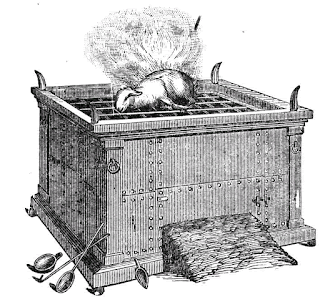This morning I was in Leviticus 6. In most of my reading programs Leviticus does me in. This time through I am looking with a different set of eyes. I am looking for the why of things. As always in my study or reading I am constantly looking for repetition. This morning was no exception. I found some.
Look at Leviticus 6:12 – 13, note that the phrase, “The fire on the altar shall be kept burning on it. It shall not go out,” at the first of verse 12 is repeated, somewhat more strongly, in verse 13. Only the last few words change in my version from “It shall not go out,” in verse 12 to “it is not to go out,” in 13.
That intrigued me. Why was that fire not to go out?
First I looked at the Hebrew. I noted first that the changes in the language from 12 to 13 was a decision of the translators and did not reflect the original. The phrase is essentially identical in the Hebrew text. The Lord does not want that fire to go out.
The purpose of the sacrifice is atonement. Atonement for the nation and individuals. Atonement for the sin of the nation or an individual. As I thought through that it perhaps the reason for the fire never to be allowed to go out, is the need for continual atonement for both the nation and individuals.
The sin of the nation remains. The sin of the individual remains. Even after a sacrifice for sin, the essential nature of the nation and the individual remains the same. So to atone for that state, the fire could not go out.
Think of it. On the cross Jesus declared, “It is finished,” John 19:30. The atonement was complete. There was no longer a need for a continual sacrifice, a fire that was never to be allowed to go out. Why? 2 Corinthians 5:17, gives us a clue. We are made new in Christ. Our sin nature is crucified with Him, Romans 6:1 – 7.
That is very good news.
Look at Leviticus 6:12 – 13, note that the phrase, “The fire on the altar shall be kept burning on it. It shall not go out,” at the first of verse 12 is repeated, somewhat more strongly, in verse 13. Only the last few words change in my version from “It shall not go out,” in verse 12 to “it is not to go out,” in 13.
That intrigued me. Why was that fire not to go out?
First I looked at the Hebrew. I noted first that the changes in the language from 12 to 13 was a decision of the translators and did not reflect the original. The phrase is essentially identical in the Hebrew text. The Lord does not want that fire to go out.
The purpose of the sacrifice is atonement. Atonement for the nation and individuals. Atonement for the sin of the nation or an individual. As I thought through that it perhaps the reason for the fire never to be allowed to go out, is the need for continual atonement for both the nation and individuals.
The sin of the nation remains. The sin of the individual remains. Even after a sacrifice for sin, the essential nature of the nation and the individual remains the same. So to atone for that state, the fire could not go out.
Think of it. On the cross Jesus declared, “It is finished,” John 19:30. The atonement was complete. There was no longer a need for a continual sacrifice, a fire that was never to be allowed to go out. Why? 2 Corinthians 5:17, gives us a clue. We are made new in Christ. Our sin nature is crucified with Him, Romans 6:1 – 7.
That is very good news.

Well said, Mike. And "Think of it we should," constantly. It must surely be one of, if not the, most amazing truth in the universe of all time, in fact before any time.
ReplyDeleteAt this stage of my limited understanding I think we will meditate and continue to learn the wonder of this and praise and sing the worthiness of the Lamb Who was slain for us.
It is an infinite truth, and we will spend eternity, I believe, exploring the depths of such suffering, such love and such forgiveness. And with clear minds and hearts we will worship and adore Him more deeply as the endless ages roll on.
What a wonder that we should be able to start now....